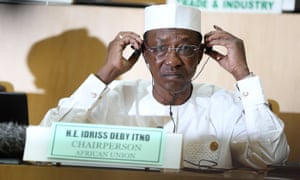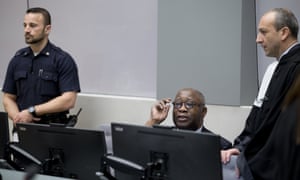Date: Sat, 11 Jun 2016 21:10:01 +0200
Leaders at Addis Ababa summit support pullout of international criminal court in protest at perceived unfair targeting

Members of the African Union have backed a Kenyan proposal to push for withdrawal from the international criminal court, repeating claims that it unfairly targets the continent.
Chad’s president, Idriss Déby, who was elected African Union chairman at the two-day summit in Addis Ababa, criticised the court for focusing its efforts on African leaders.
“Elsewhere in the world, many things happen, many flagrant violations of human rights, but nobody cares,” Déby said at the close of the summit late on Sunday, which had an official theme of protecting human rights.
No legally binding decision was made, and the decision to leave the ICC’s founding Rome statute can be decided by individual nations. The decision was a “proposal … for the AU to develop a roadmap for the withdrawal of African nations”, a Kenyan presidential statement read.
The war crimes trial of the former Ivory Coast president Laurent Gbagbo began last week, rekindling a bitter row across Africa over the international justice system.
Set up in 2002 as the last resort to try war criminals and perpetrators of genocide never tried at home, the ICC has opened inquiries involving nine nations, all but one of them African: Kenya, Ivory Coast, Libya, Sudan, Democratic Republic of Congo, Central African Republic (twice), Uganda, Mali and, most recently, Georgia.

The AU, and particularly Kenya, has accused the court of unfairly targeting Africans for prosecution. Cases included a failed case to Kenya’s president, Uhuru Kenyatta, and a faltering case against his deputy, William Ruto, for allegedly masterminding deadly post-election violence in 2007-09 in which about 1,200 people died.
“We refuse to be carried along in a vehicle that has strayed off course to the detriment of our sovereignty, security and dignity as Africans,” Kenyatta said in a statement.
In November 2015, Ethiopia’s foreign minister, Tedros Adhanom, speaking for the AU at an annual meeting of the 123 countries that have signed up to the Hague-based ICC’s founding statute, said it was “no longer a court for all”.
About one-third of the court’s member states are in Africa. While some leaders criticised the court, others said that was a mistake. “Leaving the ICC with no credible mechanism for justice for mass crimes in sight would be an error of colossal proportions,” Kenya’s Daily Nation said in an editorial.
“It is far better for member states to stay in the court and advocate reforms, rather than bolting and leaving millions on the continent unprotected by an international court which can step in when national institutions fail.”
On Monday the trial of Gbagbo continued, with defence lawyers accusing the current Ivorian president, Alassane Ouattara, of seizing power by force aided by the former colonial ruler France after disputed 2010 elections.
“Ouattara and his supporters wanted to seize power by force and the battle of Abidjan was, simply put, the very implementation of this strategy,” the defence lawyer Emmanuel Altit told the ICC.
Gbagbo and his co-accused, Charles Blé Goudé, a firebrand militia leader, have denied four charges of crimes against humanity when 3,000 people were killed after the Ivory Coast vote. Their highly anticipated trial opened on Thursday and is set to last three to four years.
Gbagbo declared himself the winner of the election in late 2010, which was contested by western powers including France and the US, and theUnited Nations-backed Ouattara.
It led to a bitter standoff, with Gbagbo holed up in the fortified presidential palace and Abidjan – the country’s main city and commercial capital – turned into a warzone.
The ICC chief prosecutor Fatou Bensouda has alleged that Gbagbo, aided by the military, police and a youth militia group organised by Blé Goudé, tried to cling to power by “all means necessary”.
But Altit countered on Monday that there had been a deliberate campaign to make Gbagbo “out to be some of kind demon” and “paint Ouattara as the good guy”.
He said: “This is nothing more than a political narrative that has been heated up and re-served.”